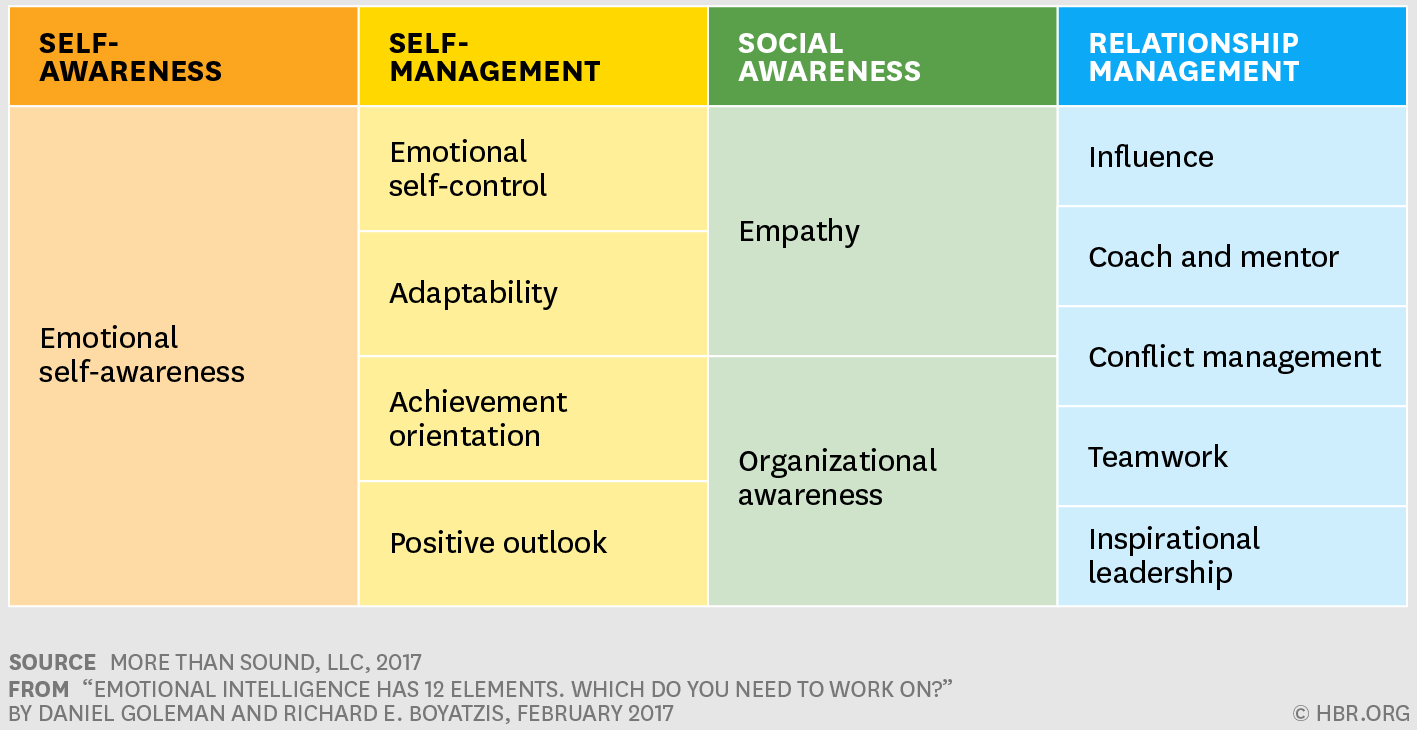If there was only one thing you should take away for your personal development, it should be the notion of Emotional Intelligence. It encompasses all the skills you need to develop and nurture great relationships, take the right decisions, grow in your career, face challenging situations with calm, have a positive influence on others, and be happy. Basically everything everyone has ever wanted.
The term “Emotional Intelligence” was first mentioned in 1964 in a paper on emotional meaning, but it became popular in 1996 with the book by Daniel Goleman, Emotional Intelligence: why it can matter more than IQ. He defines Emotional Intelligence as “the ability to identify, assess, and control one’s own emotions, the emotions of others, and that of groups“. How do you do that?
The 4 domains of Emotional Intelligence and their competencies
Daniel Goleman says Emotional Intelligence (EI) is composed of four elements that each contain various skills.

Self-awareness
- Clear perception of who you are: thoughts, beliefs, values, motivations, identity, and purpose
- Ability to recognise your own emotions in the moment: you know what you are feeling and the reason why you are feeling this way
- Accurate sense of your strengths, weaknesses, and limitations
- Constant drive to look within and understand your behaviours and internal processes
Self-management
- Ability to monitor and control your own emotions and how they are showing to other people: control of your expressions and body language
- Acceptance of your emotions as they are and ability to share them
- Confidence, assertiveness, and independence: ability to take ownership for what happens in your life, being grounded, and self-reliant – rather than blaming others or putting the responsibility on them
- Positive outlook on life: seeing the glass half full, being thankful
- Interest in learning and developing yourself beyond what you already are
- Ability to adjust to circumstances in a constructive way
Social awareness
- Ability to recognise, appreciate, and respect how others feel
- Ability to put yourself in people’s shoes at any given time
- Develop and maintain meaningful relationships
- Ability to actively listen
- Understanding of social, economical, and political influences on groups, organisations, society, etc.
Relationship management
- Ability to positively influence others by being honest and authentic
- Successfully cope with stressful situations, not letting them overwhelm you
- Handle conflict in a calm and mature way: using empathy in arguments and disagreements to reach a compromise, instead of drawing on frustration and anger
- Be genuine in sharing your experiences and learnings to mentor others
- Work constructively as a team, allowing everyone to play their part
- Inspire others
Emotional Intelligence is not just about knowing yourself, but also how you manage yourself, how you manage others, and what you can bring to them.
Emotional Intelligence applied to work
When EI is applied to the work environment, a fifth component can be added to assess your emotional quotient (EQ, as opposed to IQ for the intelligence): your motivation.

- Why do you do what you do?
- What are your biggest motivators?
It matters to know if you are motivated by intrinsic or extrinsic motivation. Being primarily motivated by external rewards (like money or status) isn’t always on par with a high EQ. It usually means that people are focused on reaching the top of an imaginary ladder on their own, leaving others at the bottom. The reality is that the top of the ladder can mean different things for different people, for instance find love, be fulfilled, have a good work-life balance, etc. So why not making the ladder much bigger and inspiring others to climb it with you? If you understand this, you have developed empathy, social awareness, and relationship management skills. Reaching money and status can be satisfying for many, but these rewards should probably come as a consequence of your passion for work, not as the primary motivation.
How do you know which skills you have, and which ones you could improve?
After reading the four components of EI and how motivation also matters, you probably already have an idea of where you are, what your strengths are, and where your focus should be.
If you want to explore it in more details, I invite you to answer the questions below:
- How do you recognise when you are feeling strong emotions like anger, frustration, etc.?
- How do you control your emotions? What are your body language and facial expression saying to others?
- How do you react in front of people who do not control their emotions? What does it tell you about controlling yours?
- What is it that you learned from your past failures and errors? How can you apply that to your life?
- What does authenticity mean to you? How are you being authentic with others?
- What do you find easy to do with others? What do you find difficult to do?
- What relationships are the most important to you today? What makes them meaningful?
- How do you relate to others?
- What positive and negative feedback do you always receive from others? What can you do about it?
- What do you want to do more of? What do you want to do less of?
- How are you influencing others?
Daniel Goleman wrote:
“People with well-developed emotional skills are also more likely to be content and effective in their lives, mastering the habits of mind that foster their own productivity; people who cannot marshal some control over their emotional life fight inner battles that sabotage their ability for focused work and clear thought.”
Think about times where you struggle with yourself. What are your inner battles? What happens right before you start the fight? Are there recurring events or patterns you can identify that trigger a very strong, almost uncontrollable, emotional response?
You can ask people who know you very well and who will be honest with you to answer these questions about you. They might have a different opinion and will bring new perspective.
These are just a few tips to help you dig into your emotional intelligence skills. Mindfulness is a great resource to start your self-exploration. Being in the moment, being in touch with reality rather than what you perceive as reality, is the underlying goal here. There will be more to come on that on the blog.
Sources
- Harvard Business Review
- Daniel Goleman, Emotional Intelligence: why it can matter more than IQ, 1996

